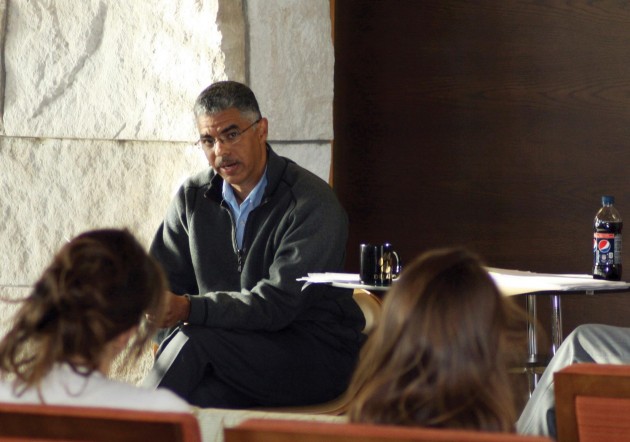
Keith Woods, National Public Radio's vice president for diversity in news and operations, addressed students and faculty Tuesday at Prindle Institute for Ethics during a talk entitled "The Power of the Personal Essay."
Woods, a former reporter, editor and editorial writer for the New Orleans Times-Picayune, essayist and frequent writer on race and race relations, discussed issues of ethics and life writing.
Woods opened the conversation by sharing a portion of a memoir he is currently writing. The selection captured four weekends in the summer and fall of 2005, when his father was facing death and his family in New Orleans was recovering from Hurricane Katrina.
Woods's reflections stirred many audience members to reflect personally. His words caused them to think of similar stories, though they weren't directly impacted by the same events as Woods.
Woods' primary goal was to discuss the ways in which he believes that personal essays can be powerful. He identified three sources of power within personal essays.
"I want to talk about power, not as a single thing, but as three things," Woods said. "It's the power the story exerts over the storyteller, the power in the tale itself and the power the story has to influence the reader. Power meets responsibility whenever ethics meets craft."
Woods continued by describing the power of a story as one that insists on being told. If a story insists on being told, the story uses its power on the writer, according to Woods.
Another issue common to writers that Woods addressed was the challenge writers face when bringing other characters into their stories, such as people who they interact with on a regular basis.
"Sometimes you just have to tell what happened, because that is more than enough and in the telling, in the depth of detail, the resonance of the voice, people are going to get hurt," he said. "The more powerful the piece, sometimes the greater the possibility of harm. That's the ethical dimension."
Woods' ethical response to this challenge is to provide truth and only tell readers what they absolutely need to know to understand his side of the story.
Another challenge for writers that Woods raised, is the question of whether or not a writer can deliver a story accurately if it based solely on memory. He faces this challenge, as the first piece he read was written entirely from memory. He again returned to truth as a response to this challenge.
"To have the power of this form, you have to get to truth, you have to get as close as you possibly can as often as you possibly can," he said.
The second piece Woods shared, entitled "The Dress" brought up another challenge for writers. In the story, Woods used a device that wasn't true to the story to help tell it.
"The device itself is just the way I remember it," he said.
Some students left the talk with a different outlook for personal essays and the challenges writers face when composing them.
"It's not something I thought about at first, like when you're writing a story, the other people implied in it," Prindle intern and senior Liz Anichini said. "You have to consider, especially if you're going to go public, how people who are in the story, are also going to be considered."
Of Woods's entire presentation, though, Anichini thought the most powerful aspect was hearing the essays read out loud by Woods.
"When he's there reading it to you, it adds another dimension to it."
